Fleurs du Mal Magazine


Or see the index
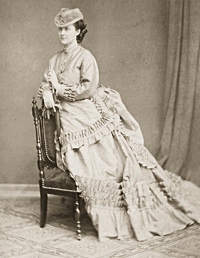
Der Krieg
Aus Plewna wandert ein Geisterzug,
Die türkischen Helden gefangen,
In Fetzen und barfuss, von Hunger verzehrt,
Die Glieder schlottern und hangen.
Viel Tausende wanken wie Schatten dahin,
Zur Donau ziehen die Armen,
Die nächtlichen Wolken durchheult der Wind,
Laut brüllend, wie Schlachtenerbarmen.
In lautloser Stille, so wandern sie hin
Durch schneeverdichtete Fluren,
Bedeckt mit Leichen – die Raben und Kräh’n
Verkünden der Fallenden Spuren.
Nur Leichen liegen von Plewna hin
Zur Donau in Reihen gesäet,
Ein grässlich’ Schlachtfeld, wo Ross und Mann
Am Wagen erfroren, verwehet.
Die Wandernden schreien um Hülfe noch,
Dann knien sie, beten stille,
Mit ihren Armen gen Morgenland,
Und sterben -‘s ist Allahs Wille.
Von Plewna zur Donau, wer Kräfte hat,
Vollendet die grausige Reise,
Da glitzert düster im Abendrot
Nicropolis, starrend von Eise.
Und rings ertönt ein Heulen und Schrei’n:
“O wollet uns Speise doch geben!
Was habt Ihr nicht lieber erschossen uns gleich!”
Die Lüfte, die eisigen, beben.
Zehntausend Gefangene schreien nach Brot,
Kein Brot ist zur Stunde zu haben,
Und markerschütternd durchtobt der Schrei
Die Straßen, die Wälle, den Graben.
Zehntausend liegen in jener Nacht
Verhungernd, mit sterbendem Munde,
Die Sieger sind selber von Tod bedroht –
Kein Brot! und nur Eis in der Runde!
Kein Brot! Und von jenseits da winkt das Land,
In dem lange verheißenen Frieden,
Doch hat sie die Donau mit krachendem Eis
In gewaltigen Massen geschieden.
Kein Brot! und es frieret in jener Nacht,
Als hätte Natur sich geschworen,
Den beiden Heeren den Untergang,
Fast waren sie alle verloren.
Doch endlich grauet der Tag, es kann
Die Panzerbarkasse nun wagen,
Vom Eis getragen! ein wenig Brot
Zu gemarterten Helden zu tragen.
Carmen Sylva
(1843-1916)
Der Krieg
Gedicht
• fleursdumal.nl magazine
More in: Archive S-T, Archive S-T, CLASSIC POETRY, WAR & PEACE
The Balkans, in particular the turbulent ex-Yugoslav territory, have been among the most important world regions in Noam Chomsky’s political reflections and activism for decades.
His articles, public talks, and correspondence have provided a critical voice on political and social issues crucial not only to the region but the entire international community, including “humanitarian intervention,” the relevance of international law in today’s politics, media manipulations, and economic crisis as a means of political control.
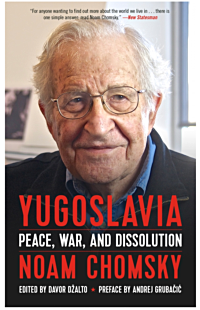 This volume provides a comprehensive survey of virtually all of Chomsky’s texts and public talks that focus on the region of the former Yugoslavia, from the 1970s to the present. With numerous articles and interviews, this collection presents a wealth of materials appearing in book form for the first time along with reflections on events twenty-five years after the official end of communist Yugoslavia and the beginning of the war in Bosnia.
This volume provides a comprehensive survey of virtually all of Chomsky’s texts and public talks that focus on the region of the former Yugoslavia, from the 1970s to the present. With numerous articles and interviews, this collection presents a wealth of materials appearing in book form for the first time along with reflections on events twenty-five years after the official end of communist Yugoslavia and the beginning of the war in Bosnia.
The book opens with a personal and wide-ranging preface by Andrej Grubačić that affirms the ongoing importance of Yugoslav history and identity, providing a context for understanding Yugoslavia as an experiment in self-management, antifascism, and mutlethnic coexistence.
Noam Chomsky (1928) is Institute Professor in the Department of Linguistics and Philosophy at the Massachusetts Institute of Technology, Boston. A member of the American Academy of Science, he has published widely in both linguistics and current affairs. His books include At War with Asia, Towards a New Cold War, Fateful Triangle: The U. S., Israel and the Palestinians, Necessary Illusions, Hegemony or Survival, Deterring Democracy, Failed States: The Abuse of Power and the Assault on Democracy and Manufacturing Consent: The Political Economy of the Mass Media.
Title: Yugoslavia: Peace, War, and Dissolution
Author: Noam Chomsky
Edited by Davor Džalto
Preface by Andrej Grubačić
Subjects: Politics / History-Europe
Publisher: PM Press
ISBN: 978-1-62963-442-5
Published: 04/2018
Language: English
Format: Paperback
Size: 6×9
240 pages
$15.63
# new books
Noam Chomsky
Yugoslavia: Peace, War, and Dissolution
• fleursdumal.nl magazine
More in: - Book News, - Book Stories, Archive C-D, AUDIO, CINEMA, RADIO & TV, MONTAIGNE, Noam Chomsky, WAR & PEACE
No writer plunged more vigorously into the chaotic energies of the 1960s than Norman Mailer, fearlessly revolutionizing literary norms and genres to capture the decade’s political, social, and sexual explosions.
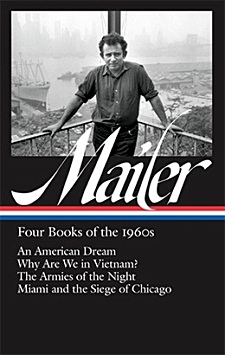 Declaring himself to have “the mind of an outlaw,” he adhered closely to his own vision of what it meant to be a writer.
Declaring himself to have “the mind of an outlaw,” he adhered closely to his own vision of what it meant to be a writer.
In a way uniquely his own, he merged the public and the private, the personal and the political, taking risks with every sentence. Here, for the first time in a single volume, are four of his most extraordinary works.
War hero, television star, existential hipster, seducer, murderer: such is Stephen Rojack, the hero of An American Dream (1965), Mailer’s hallucinatory voyage through the dark night of an America awash in money, sex, and violence.
Mailer challenged himself by serializing the book while he was still writing it, an approach he compared to “ten-second chess.” The result is a fever dream of a novel, navigating through the most extreme fears and fantasies of a culture hooked on power.
In Why Are We in Vietnam? (1967) a motor-mouthed eighteen-year-old Texan on the eve of military service recounts an exclusive grizzly bear hunt in Alaska with an obscene exuberance that finally comes close to horror. Although the word “Vietnam” appears only on the book’s final page, the whole work is imbued with a sense of frantic bloodthirstiness that exposes the macho roots of the war.
With the acclaimed “non-fiction novel” The Armies of the Night (1968), an account of the October 1967 anti-Vietnam War march on the Pentagon, Mailer brought a new approach to journalism, casting himself (“he would have been admirable, except that he was an absolute egomaniac, a Beast”) as a player in the drama as he reported, alongside a stunning gallery of student activists, politicians, intellectuals, and policemen. Winning both the Pulitzer Prize and National Book Award, The Armies of the Night immediately established itself as an essential record of its moment.
In Miami and the Siege of Chicago (1968) Mailer continued his eyewitness chronicle of American political life, embedding himself at the 1968 Republican and Democratic presidential conventions and drawing unforgettable portraits of Richard Nixon, Nelson Rockefeller, Lyndon Johnson, Eugene McCarthy, and many others. His reading of the nation’s political undercurrents continues to surprise with its relevance.
J. Michael Lennon, editor, emeritus professor of English at Wilkes University, is Norman Mailer’s archivist, editor, and authorized biographer, and president of the Norman Mailer Society. His books include Norman Mailer: A Double Life (2013) and Selected Letters of Norman Mailer (2014).
This Library of America series edition is printed on acid-free paper and features Smyth-sewn binding, a full cloth cover, and a ribbon marker.
Norman Mailer: Four Books of the 1960s (LOA #305):
-An American Dream
-Why Are We in Vietnam?
-The Armies of the Night
-Miami and the Siege of Chicago
Hardcover
March 13, 2018
by Norman Mailer (Author)
J. Michael Lennon (Editor)
937 pages
ISBN: 978-1-59853-558-7
Library of America Series
N° 305
LOA books are distributed worldwide by Penguin Random House
List Price: $45.00
LIBRARY OF AMERICA is an independent nonprofit cultural organization founded in 1979 to preserve our nation’s literary heritage by publishing, and keeping permanently in print, America’s best and most significant writing. The Library of America series includes more than 300 volumes to date, authoritative editions that average 1,000 pages in length, feature cloth covers, sewn bindings, and ribbon markers, and are printed on premium acid-free paper that will last for centuries.
# new books
Norman Mailer:
Four Books of the 1960s (LOA #305):
-An American Dream
-Why Are We in Vietnam?
-The Armies of the Night
-Miami and the Siege of Chicago
• fleursdumal.nl magazine
More in: - Book Lovers, - Book Stories, Archive M-N, Art & Literature News, Norman Mailer, WAR & PEACE

The End
After the blast of lightning from the east,
The flourish of loud clouds, the Chariot Throne;
After the drums of time have rolled and ceased,
And by the bronze west long retreat is blown,
Shall Life renew these bodies? Of a truth
All death will he annul, all tears assuage?-
Or fill these void veins full again with youth,
And wash, with an immortal water, Age?
When I do ask white Age he saith not so:
‘My head hangs weighed with snow.’
And when I hearken to the Earth, she saith:
‘My fiery heart shrinks, aching. It is death.
Mine ancient scars shall not be glorified,
Nor my titanic tears, the seas, be dried.’
Wilfred Owen
(1893 – 1918)
The End
fleursdumal.nl magazine
More in: Archive O-P, Owen, Wilfred, WAR & PEACE
A compelling history of women in seventeenth century espionage, telling the forgotten tales of women from all walks of life who acted as spies in early modern Britain.
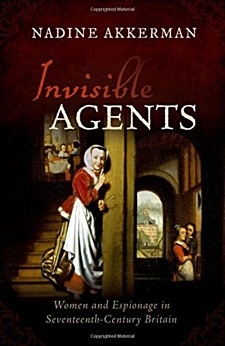 Nadine Akkerman has immersed herself in archives and letter collections, acting as a modern-day Spymistress to unearth plots and conspiracies that have long been hidden by history.
Nadine Akkerman has immersed herself in archives and letter collections, acting as a modern-day Spymistress to unearth plots and conspiracies that have long been hidden by history.
It would be easy for the modern reader to conclude that women had no place in the world of early modern espionage, with a few seventeenth-century women spies identified and then relegated to the footnotes of history.
If even the espionage carried out by Susan Hyde, sister of Edward Hyde, Earl of Clarendon, during the turbulent decades of civil strife in Britain can escape the historiographer’s gaze, then how many more like her lurk in the archives?
Nadine Akkerman’s search for an answer to this question has led to the writing of Invisible Agents, the very first study to analyse the role of early modern women spies, demonstrating that the allegedly-male world of the spy was more than merely infiltrated by women.
This compelling and ground-breaking contribution to the history of espionage details a series of case studies in which women – from playwright to postmistress, from lady-in-waiting to laundry woman – acted as spies, sourcing and passing on confidential information on account of political and religious convictions or to obtain money or power.
The struggle of the She-Intelligencers to construct credibility in their own time is mirrored in their invisibility in modern historiography.
Akkerman has immersed herself in archives, libraries, and private collections, transcribing hundreds of letters, breaking cipher codes and their keys, studying invisible inks, and interpreting riddles, acting as a modern-day Spymistress to unearth plots and conspiracies that have long remained hidden by history.
Nadine Akkerman is Reader in early modern English Literature at Leiden University and Visiting Fellow at All Souls College, Oxford. She is author of the critically acclaimed Invisible Agents: Women and Espionage in Seventeenth-Century Britain (OUP), and of The Correspondence of Elizabeth Stuart, Queen of Bohemia (OUP), the third and final volume of which will be published in 2020, and is currently writing the definitive biography of Elizabeth Stuart. She has also published extensively on women’s history, diplomacy, and masques, and curated several exhibitions, including the popular Courtly Rivals at the Haags Historisch Museum. In 2017 she was elected to The Young Academy of the Royal Netherlands Academy of Arts and Sciences, and received a Special Recognition Award from the World Cultural Council.
Invisible Agents
Women and Espionage in Seventeenth-Century Britain
Nadine Akkerman
Language: English
Oxford University Press
Hardcover
288 pages
Published: 12 July 2018
8 colour plates & 12 black and white images
234x156mm
ISBN-10: 0198823010
ISBN-13: 978-0198823018
£20.00
# new books
Nadine Akkerman:
Invisible Agents
fleursdumal.nl magazine
More in: #Biography Archives, *War Poetry Archive, - Book News, - Book Stories, Archive A-B, CRIME & PUNISHMENT, History of Britain, Tales of Mystery & Imagination, WAR & PEACE
It’s 1944 and sixteen-year-old ballerina and gymnast Edith Eger is sent to Auschwitz.
 Separated from her parents on arrival, she endures unimaginable experiences, including being made to dance for the infamous Josef Mengele. When the camp is finally liberated, she is pulled from a pile of bodies, barely alive.
Separated from her parents on arrival, she endures unimaginable experiences, including being made to dance for the infamous Josef Mengele. When the camp is finally liberated, she is pulled from a pile of bodies, barely alive.
The horrors of the Holocaust didn’t break Edith. In fact, they helped her learn to live again with a life-affirming strength and a truly remarkable resilience. The Choice is her unforgettable story.
“Edith’s strength and courage are remarkable…her life and work are an incredible example of forgiveness, resilience, and generosity.”— Sheryl Sandberg
Edith Eva Eger
An eminent psychologist and one of the few remaining Holocaust survivors old enough to remember life in the camps, Dr. Edith Eger has worked with veterans, military personnel, and victims of physical and mental trauma. She lives in La Jolla. The Choice is her first book.
“One of those rare and eternal stories that you don’t want to end and that leave you forever changed.” — Desmond Tutu, Nobel Peace Prize Laureate
The Choice.
Embrace the Possible
by Edith Eva Eger
Winner of the 2017 National Jewish Book Award and 2018 Christopher Award
Publisher: Scribner Book Company
Language: English
Hardcover: 304 pages
(September 5, 2017)
Paperback: 320 pages
(September 2018)
# new novel
Dr. Edith Eva Eger
fleursdumal.nl magazine
More in: - Book News, - Book Stories, Archive E-F, Art & Literature News, Holocaust
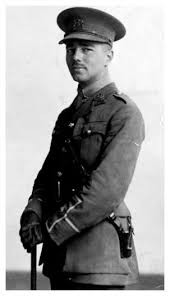
Dulce et Decorum Est
Bent double, like old beggars under sacks,
Knock-kneed, coughing like hags, we cursed through sludge,
Till on the haunting flares we turned our backs,
And towards our distant rest began to trudge.
Men marched asleep. Many had lost their boots,
But limped on, blood-shod. All went lame; all blind;
Drunk with fatigue; deaf even to the hoots
Of gas-shells dropping softly behind.
Gas! GAS! Quick, boys!—An ecstasy of fumbling
Fitting the clumsy helmets just in time,
But someone still was yelling out and stumbling
And flound’ring like a man in fire or lime.—
Dim through the misty panes and thick green light,
As under a green sea, I saw him drowning.
In all my dreams before my helpless sight,
He plunges at me, guttering, choking, drowning.
If in some smothering dreams, you too could pace
Behind the wagon that we flung him in,
And watch the white eyes writhing in his face,
His hanging face, like a devil’s sick of sin;
If you could hear, at every jolt, the blood
Come gargling from the froth-corrupted lungs,
Obscene as cancer, bitter as the cud
Of vile, incurable sores on innocent tongues,—
My friend, you would not tell with such high zest
To children ardent for some desperate glory,
The old Lie: Dulce et decorum est
Pro patria mori.
Wilfred Owen
(1893 – 1918)
Dulce et Decorum Est (Poem)
# Armistice of 11 November 1918 – 2018
fleursdumal.nl magazine
More in: Archive O-P, Archive O-P, Galerie des Morts, Galerie Deutschland, Histoire de France, Historia Belgica, History of Britain, Owen, Wilfred, WAR & PEACE
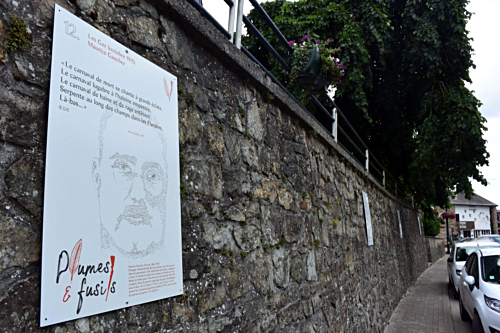
Redu, en tant que village du livre, ne peut célébrer le centième anniversaire de la fin de la Grande Guerre qu’en mettant à l’honneur la littérature de l’époque.
 L’angle de vue choisi est celui de la poésie née sur, ou au plus près des champs de bataille et des tranchées.
L’angle de vue choisi est celui de la poésie née sur, ou au plus près des champs de bataille et des tranchées.
Une poésie européenne au sens le plus large qui balaie l’Europe de la Russie aux Iles britanniques ; une poésie qui, pour exprimer la puissance de cette première conflagration mondiale en son effet sur le corps et sur les consciences, se cherche des formes nouvelles.
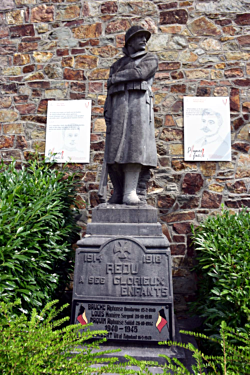 En ce début du vingtième siècle le soldat est scolarisé.
En ce début du vingtième siècle le soldat est scolarisé.
Il lit, il écrit : des lettres, des carnets d’instantanés, et de la poésie, qui rendent compte de l’instant d’angoisse, de désespoir, de sentiment d’abandon dans un monde devenu fou.
Ainsi la Grande Guerre donne-t-elle naissance à une poésie de l’instant vécu avec une intensité hors norme par des écrivains devenus combattants.
Ce parcours tracé dans les rues de Redu, les poèmes affichés aux murs du village, en témoignent.
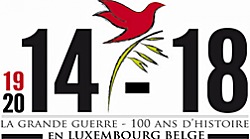
Du 19 mai au 11 novembre 2018
Un circuit de 20 poèmes des soldats de la Grande Guerre.
https://www.redu-villagedulivre.be/fr/
photos: fleursdumal.nl
fleursdumal.nl magazine
More in: *War Poetry Archive, - Book Lovers, - Bookstores, Art & Literature News, FDM Art Gallery, Galerie des Morts, Historia Belgica, WAR & PEACE
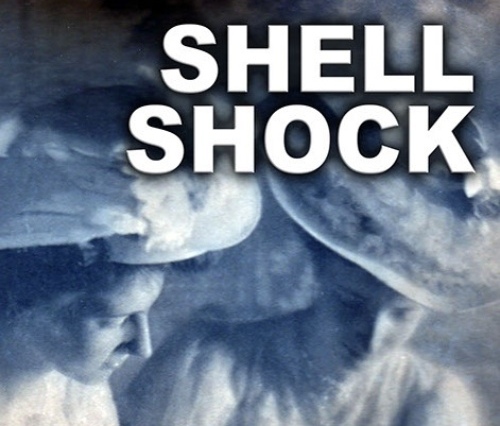
The true story of twin sisters, Dorothea and Gladys Cromwell, born into New York’s Gilded Age, living lives of wealth and privilege, as told by Dennis Whitehead.
Amid the fervor of America’s entry into the First World War, the sisters volunteered for service with the American Red Cross in France, a country they knew and loved. To French soldiers seeking refreshment and solace in the Red Cross canteen, the identical twins were known as anges jumeaux, the twin angels.
Witnessing the non-stop horrors in the worst fighting in the war, the sisters were utterly exhaustion, both mentally and physically, when they boarded the SS La Lorraine for the return journey home. They had wished to continue their service to the people of France after the fighting stopped but were convinced to return to New York by their brother.
What happened on that ship, on that frigid January 1919 evening, almost one-hundred years ago, is one of the great untold stories of World War I, and the impact that modern warfare had upon not just the men in the trenches, but upon its women and other non-combatants, as well as civilians, that remained unrecognized until the Vietnam War.
Dennis Whitehead: A native of Cincinnati and a graduate of Ohio University, Dennis Whitehead is a writer, photographer, and media producer in Arlington, Virginia.
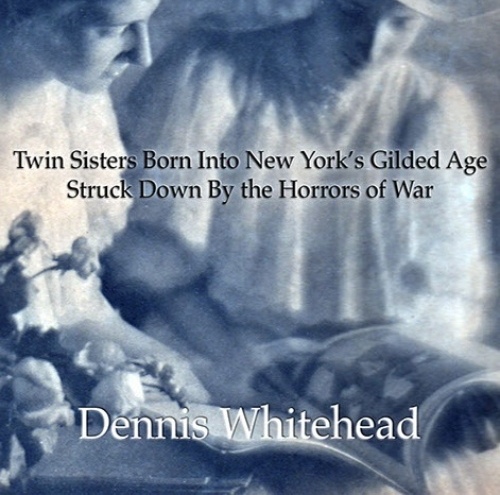
Shell Shock: Twin Sisters Born Into New York’s Gilded Age Struck Down by the Horrors of War
by Dennis Whitehead
Kindle Edition
$2,99
Available for download
Language: English
File Size: 27502 KB
Print Length: 52 pages
Publisher: MMImedia LLC (July 18, 2018)
Publication Date: July 18, 2018
Amazon Digital
# More information and link with Amazon Kindle Edition
Shell Shock is the story of the twin Cromwell sisters who served with the American Red Cross in World War I France. Witnessing the unrelenting horrors of war, the Cromwell sisters illustrate the unrecognized trauma wrought upon non-combatants in the First World War. Gladys Cromwell (1885-1919) was a very talented poet.
# Digital biography
American writers
Gladys Cromwell
fleursdumal.nl magazine
More in: #Biography Archives, *War Poetry Archive, - Book Stories, Archive C-D, Archive W-X, AUDIO, CINEMA, RADIO & TV, Gladys Cromwell, Photography, WAR & PEACE
They asked me what I thought of the atomic bomb. I said I had not been able to take any interest in it.
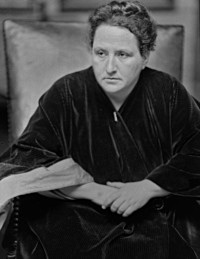 I like to read detective and mystery stories. I never get enough of them but whenever one of them is or was about death rays and atomic bombs I never could read them.
I like to read detective and mystery stories. I never get enough of them but whenever one of them is or was about death rays and atomic bombs I never could read them.
What is the use, if they are really as destructive as all that there is nothing left and if there is nothing there nobody to be interested and nothing to be interested about. If they are not as destructive as all that then they are just a little more or less destructive than other things and that means that in spite of all destruction there are always lots left on this earth to be interested or to be willing and the thing that destroys is just one of the things that concerns the people inventing it or the people starting it off, but really nobody else can do anything about it so you have to just live along like always, so you see the atomic [bomb] is not at all interesting, not any more interesting than any other machine, and machines are only interesting in being invented or in what they do, so why be interested.
I never could take any interest in the atomic bomb, I just couldn’t any more than in everybody’s secret weapon. That it has to be secret makes it dull and meaningless. Sure it will destroy a lot and kill a lot, but it’s the living that are interesting not the way of killing them, because if there were not a lot left living how could there be any interest in destruction.
Alright, that is the way I feel about it. They think they are interested about the atomic bomb but they really are not not any more than I am. Really not. They may be a little scared, I am not so scared, there is so much to be scared of so what is the use of bothering to be scared, and if you are not scared the atomic bomb is not interesting.
Everybody gets so much information all day long that they lose their common sense. They listen so much that they forget to be natural. This is a nice story.
Gertrude Stein, 1946
(First published in Yale Poetry Review, December 1947)
Stein, Gertrude
(1874-1946)
Reflection on the Atomic Bomb
fleursdumal.nl magazine
More in: Archive S-T, Archive S-T, Gertrude Stein, Stein, Gertrude, WAR & PEACE
Anfang der 1930er Jahre lebten in Berlin und anderen deutschen Großstädten infolge der prekären wirtschaftlichen Verhältnisse tausende Jugendliche auf der Strasse.
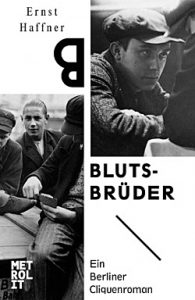 Sie verdingten sich als Tagelöhner und Laufburschen, aber häufig führte ihr Weg sie auch in die Kriminalität oder Prostitution. Zuflucht und ein wenig Sicherheit und soziale Wärme fanden sie in selbstorganisierten Cliquen. Sie boten aber nicht nur Schutz, sondern waren auch Ausdruck einer proletarischen Jugend-Subkultur.
Sie verdingten sich als Tagelöhner und Laufburschen, aber häufig führte ihr Weg sie auch in die Kriminalität oder Prostitution. Zuflucht und ein wenig Sicherheit und soziale Wärme fanden sie in selbstorganisierten Cliquen. Sie boten aber nicht nur Schutz, sondern waren auch Ausdruck einer proletarischen Jugend-Subkultur.
In stillgelegten Fabrikbaracken traf man sich, trank, tanzte und pflegte einen Lebensstil, der durch den Hass auf die bürgerliche Gesellschaft und die Welt der Erwachsenen geprägt war. In diesem heute vergessenen, aber gut dokumentierten Milieu ist dieser von Ernst Haffner geschriebene und unter den Nazis verbotene und bei den Bücherverbrennungen öffentlich zerstörte Roman angesiedelt.
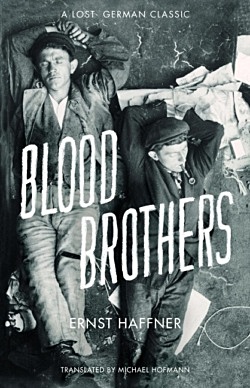 Im Mittelpunkt stehen zwei aus Erziehungseinrichtungen geflüchtete Jugendliche und die Clique der Blutsbrüder, der sie sich nach ihrer Ankunft in Berlin anschließen. Erst glücklich, dort aufgenommen worden zu sein, realisieren sie bald, dass sich die “Blutsbrüder” unter der Leitung ihres Anführers immer mehr zu einer professionellen Bande entwickeln, die mit Einbrüchen, Laden- und Trickdiebstählen ihre Existenz sichern.
Im Mittelpunkt stehen zwei aus Erziehungseinrichtungen geflüchtete Jugendliche und die Clique der Blutsbrüder, der sie sich nach ihrer Ankunft in Berlin anschließen. Erst glücklich, dort aufgenommen worden zu sein, realisieren sie bald, dass sich die “Blutsbrüder” unter der Leitung ihres Anführers immer mehr zu einer professionellen Bande entwickeln, die mit Einbrüchen, Laden- und Trickdiebstählen ihre Existenz sichern.
Beide probieren sich mit aller Kraft gegen ihr Schicksal zu stemmen und sich eine bescheidene, aber unabhängige Existenz aufzubauen.
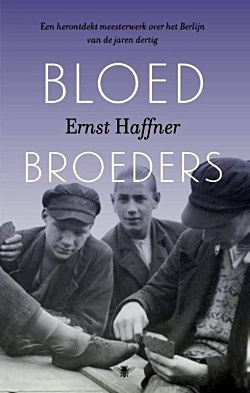 Ernst Haffner arbeitete zwischen 1925 und 1933 als Journalist und Sozialarbeiter in Berlin. Mit der Machtergreifung der NSDAP verliert sich seine Spur. Sein 1932 unter dem Titel “Jugend auf der Landstraße Berlin” erschienener und einziger Roman wurde von den Nazis verboten und öffentlich verbrannt. In Vergessenheit geraten, erschien das Buch nun 80 Jahre nach seiner Erstveröffentlichung ein zweites Mal: unter dem Titel “Blutsbrüder”.
Ernst Haffner arbeitete zwischen 1925 und 1933 als Journalist und Sozialarbeiter in Berlin. Mit der Machtergreifung der NSDAP verliert sich seine Spur. Sein 1932 unter dem Titel “Jugend auf der Landstraße Berlin” erschienener und einziger Roman wurde von den Nazis verboten und öffentlich verbrannt. In Vergessenheit geraten, erschien das Buch nun 80 Jahre nach seiner Erstveröffentlichung ein zweites Mal: unter dem Titel “Blutsbrüder”.
Ernst Haffner: Blutsbrüder
Ein Berliner Cliquenroman.
Originaltitel: Jugend auf der Landstraße.
Aufbau Taschenbuch Verlag
2015
Deutsche Sprache
260 Seiten
EAN: 9783746630694
ISBN: 374663069X
Ernst Haffner
Blood Brothers
Originaltitel: Blutsbrüder.
‘Vintage Books’.
Englisch
Michael Hofmann Translator
Random House UK Ltd
2016 – 224 p.
EAN: 9780099597377
ISBN: 0099597373
Ernst Haffner
Bloedbroeders
Nederlands
Vertaald door Anne Folkertsma
2014
Uitgever De Bezige Bij
176 pagina’s
Met illustraties
ISBN109023486234
ISBN139789023486237
books to read before you die
fleursdumal.nl magazine
More in: - Book News, - Book Stories, Archive G-H, Art & Literature News, FDM in Berlin, WAR & PEACE
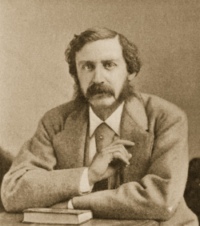
What the Bullet sang
O Joy of creation,
To be!
O rapture, to fly
And be free!
Be the battle lost or won,
Though its smoke shall hide the sun,
I shall find my love–the one
Born for me!
I shall know him where he stands
All alone,
With the power in his hands
Not o’erthrown;
I shall know him by his face,
By his godlike front and grace;
I shall hold him for a space
All my own!
It is he–O my love!
So bold!
It is I–all thy love
Foretold!
It is I–O love, what bliss!
Dost thou answer to my kiss?
O sweetheart! what is this
Lieth there so cold?
Bret Harte
(1839-1902)
What the Bullet sang
fleursdumal.nl magazine
More in: Archive G-H, Archive G-H, Bret Harte, CLASSIC POETRY, WAR & PEACE
Thank you for reading Fleurs du Mal - magazine for art & literature